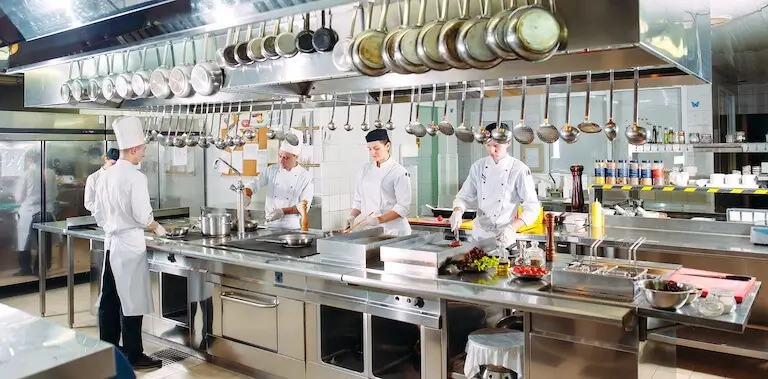Listen to This Article:
On the hunt for your next job in the restaurant and hospitality industry? Now could be a great time to make a move.
This sector is home to tremendous career opportunities, with the National Restaurant Association projecting 200,000 new jobs by the end of 2025—bringing total industry employment to just shy of 16 million jobs, its highest level ever.
But even with this growth, it still helps to have a plan for how to get from where you are today to where you want to be tomorrow.
Understanding current hiring trends and recruiter insights can help you set yourself up for success. To that end, we recently spoke with experts from Gecko Hospitality, who offered some insights for job seekers looking to make their next career move. Check out these five key tips before you submit your next application!
Tip 1: Know Your Worth – and Do Your Research
It will probably come as no surprise that earning more money is the top reason job seekers say they’re looking for a new position.
In fact, according to Gecko Hospitality’s recent survey of over 1,500 restaurant and hospitality professionals, nearly half (48%) of people looking for a new job did so to earn a better income, making compensation by far the top factor driving job changes.
| Top Reasons for Seeking a New Job | |
|---|---|
| Earning a Better Income | 48% |
| Moving to New Location | 18% |
| Getting Back into the Industry | 12% |
| Leaving a No-Growth Position | 12% |
| Finding Better Quality of Life | 10% |
And, according to that same survey, this focus on finding better paying opportunities is often worthwhile; in 2024, the average salary increase for those who changed jobs was $11,738 in hospitality and $5,815 in restaurants.
The key takeaway? Well-paying opportunities are out there—but you may need to do some research to find positions that can pay you what you’re worth.
During your next job search, try getting strategic: don’t just search for any restaurant job, but take the time to explore market salary ranges for different roles, regions, and establishment types, since all of these factors can affect your earning potential.
For example, large corporate restaurant companies like Darden (which owns brands like Olive Garden, Longhorn, and Ruth’s Chris) can offer strong financial opportunities, with executive chefs and general managers earning more than $150,000 annually. On the flipside, Gecko notes that smaller restaurant groups (that is, local groups that might own five to ten different concept restaurants) are not only showing tremendous growth, they can provide diverse experience (and income potential) while staying within one company’s ecosystem.
Job seekers who take the time to research compensation benchmarks for their target roles can put themselves in a position to apply for more lucrative opportunities and to negotiate salary based on market data. That’s a strong position to be in when you walk into your next interview!
Tip 2: Embrace Education – and Opportunity
Gecko’s report also suggested that there can be opportunities for people to advance their careers regardless of their educational background—but that, for some, pursuing an education might provide an advantage.
Survey results showed that 40% of hospitality management candidates hold four-year degrees, while 36% have no collegiate education at all. 21% hold two-year degrees, while just 3% hold a master’s degree or higher.
On the one hand, the fact that more than a third of management candidates have no college background at all highlights that there can be avenues for success in this industry no matter what one’s background might be.
At the same time, these results show that almost two out of three management-level candidates do have some form of post-secondary education, suggesting that formal training can provide competitive advantages.
| Spotlight on Educational Background of Hospitality Management Candidates | |
|---|---|
| No College | 36% |
| Two-Year Degree | 21% |
| Four-Year Degree | 40% |
| Masters or Higher | 3% |
As you think about your future, step back and consider where you’d like to see yourself in the next few years; then, think about the kind of opportunities you might want to pursue that could help you get there. There isn’t necessarily a “right” answer that applies to everyone, as Gecko’s research shows there can be multiple paths to get to the same place. But there might be an answer that could help you reach your specific goals.
For some, that might mean exploring unique opportunities like seasonal work arrangements, which can offer intensive learning experiences in high-volume kitchens. For others, that might mean taking a “step backward” in their career—that is, working in a lower position at a more prestigious establishment in order to add credibility to their resume. And some might also explore pursuing an education aligned with their unique path.

Job seekers can benefit from seeking opportunities to learn – like working under respected chefs, or attending culinary school.
Going back to school can provide a structured way to gain practical skills, business knowledge, and real-world experience that can help with career advancement. Escoffier offers eleven programs across six different disciplines, from the culinary arts to hospitality and restaurant operations management, providing students with the chance to develop a job-ready skill set and industry connections in their chosen field.
What Gecko’s experts don’t recommend is simply grinding out long hours in the belief that this alone will help you get ahead. While working excessive hours might have been a badge of honor at one time in the industry, more and more businesses are recognizing that this is unsustainable and are now prioritizing quality experience for new hires.
Consider applying that lesson to your own career moves. Are you pursuing work and educational opportunities that demand more than you can give, or that reward you by unlocking even more opportunities down the line?
Tip 3: Change Jobs Wisely – Not Randomly
While Gecko’s experts recommend actively seeking out new opportunities to advance one’s career, they also urge candidates to be mindful of the impact that job-switching can have on one’s resume.
Gecko franchise owner and recruiter Brian Blum says many employers today view job stability as having no more than three positions within a six-year period—a more flexible standard than in the past, but still one that suggests candidates should aim to stay with any given employer for at least two years on average.

Employers generally like to see a stable work history – but strategic changes can help you get ahead.
So if job stability is a good thing, does that mean that it’s better to never change your employer? According to Gecko, not at all! In fact, recruiters tend to look for diverse experience across different types of establishments; for example, someone who has worked in restaurants, private clubs, and corporate dining is often more valuable than someone with seven years at one location.
The key is to make strategic career moves: ones that have the potential to grow your skills, broaden your network, and enhance your resume—like landing a new position under a respected chef, or enrolling in culinary school.
Early in your career, ask yourself whether you’re still learning new things at your job; if not, it might be time to look elsewhere so you can keep developing your trade.
Once you reach the sous chef level, the tenure expectation changes slightly; employers will likely want to see that you’ve stayed one year per position at an absolute minimum, but preferably for longer as frequent moves become red flags about your ability to work with others.
The important takeaway here is that job seekers (especially early-career professionals) should focus on continuous learning and skill development rather than tenure at any single position—though they should remain mindful of the impact of job-switching and look to prioritize strategic moves where they can.
Tip 4: Seek Out Opportunities to Develop New Skills
Your job isn’t just a thing you do to earn money—it can be an opportunity to develop new skills that can serve you for the rest of your career. But these opportunities won’t always be obvious, and they certainly won’t take advantage of themselves. Often, you’ll have to seek them out yourself. But the effort involved in doing so can be highly worthwhile.
Taking initiative to learn beyond your assigned role demonstrates leadership potential, which can set you apart from other candidates.

Seeking out opportunities to gain new skills can be a great way to stand out to future employers.
Gecko’s experts describe a so-called “triple threat” skill set that they often see in their successful chef candidates—a skill set that includes culinary skills, leadership abilities, and financial management knowledge. While it’s certainly possible to find rewarding work without this full suite of skills, a weakness in any area can potentially put a ceiling on one’s career ambitions.
So, what can you do to develop the kind of skills that could help you climb the ranks in the industry? In their appearance on The Ultimate Dish podcast, Blum and Evan Kaplan offered some key tips on developing the skills that recruiters say matter.
- Learn another language. Bilingual skills, particularly English and Spanish fluency, are extremely valuable given the diverse workforce in most kitchens. This is especially important for those in management positions.
- Take initiative, but pace yourself. Don’t try to do everything on Day One. Get proficient in your current role first (30-45 days) before volunteering to take on additional responsibilities like writing prep lists or learning new stations. This gives you a chance to build trust with your team, avoid overloading yourself, and ensure you’re doing things the right way.
- Look for opportunities to step up. No matter what your current role in the kitchen is, look for opportunities to pitch in above your job description. For example, you might ask to learn expo during rush periods—not only can this help out your team, it can demonstrate leadership skills and give you practical management experience.
Many jobs in the restaurant and hospitality industry can require a wide range of abilities, and those with the broadest experience often rise to the top.
Again, it’s not likely that these skills will simply be handed to you—so it can be in your interest to take the initiative to seek out training that could help you get ahead.
Tip 5: Win Interviews with Authentic Storytelling and Preparation
So you’ve done your research, built up your resume, and developed relevant skills. Does that mean you’re a shoe-in for the job of your dreams? Not quite! Landing a great job still often depends on making a great impression on your prospective employer (not to mention the recruiter who may be helping you along the way).
Without a solid presentation, even the best candidates can fade into the background.
So with that in mind, what should you consider doing ahead of interviews in order to set yourself up for success?
For starters, consider the language you use to talk about your background. Recruiters and interviewers want to hear you share specific experiences and stories, rather than generic statements about being “organized” or a “natural leader.”

Candidates can make a good impression by offering specific experiences rather than generic responses.
Thorough preparation is also essential. Consider researching your interviewer on LinkedIn and studying their background—you never know what connections might emerge. You also may want to look into the history of the company you’re engaging with—for example, its ownership group, current and previous executive chefs, and so on—so that you’re fully aware of the space you’re coming into and can talk about it intelligently.
Other interview best practices include:
- Listening carefully to the interviewer’s questions and answering them directly without going off on tangents.
- Creating a strong visual portfolio showing diverse dishes that you yourself have made and that are relevant to the role you’re seeking.
- Prepare questions to ask at the end of the interview, which can show that you’ve done your research and are really interested in the position
Escoffier students can get support with these strategies through our Career Services department, which can offer guidance on resume building, interview prep, networking, and more.
One last tip that Gecko’s experts noted: your communication with potential employers isn’t limited to the interview room—it’s something you can cultivate through the way you present yourself to the world.
Don’t just “have” social media—use it to create a compelling story and a showcase for your work. Include photos and write-ups of dishes you’ve prepared and events you’ve participated in. This can create a vibrant, uniquely personal presentation that elevates everyday technology into an invaluable networking tool.
Take Charge of Your Next Career Move
The hospitality industry offers diverse career paths with strong growth potential for those who understand the industry landscape and make strategic moves to advance their careers.
Whether you’re entering the field for the first time or looking to take your career in a new direction, combining hands-on experience with formal education can provide the comprehensive foundation needed for long-term success.
If you think pursuing a culinary or hospitality education could help you achieve your career goals, contact our admissions team to learn more about what Escoffier can do to help.
Financial aid, grants, and scholarships are available to those who apply and qualify, which can potentially help make this opportunity more attainable, no matter your background.



